.
.
photo by Debbie Hazan
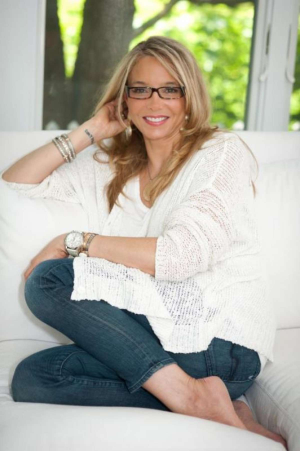
Kitt Shapiro, author (with Patricia Weiss Levy) of Eartha & Kitt: A Daughter’s Love Story in Black & White (Pegasus Books)
.
___
.
…..Being the daughter of an international celebrity is sure to have its rewards and challenges, particularly when the mother – in this case Eartha Kitt – grew up motherless and in extreme poverty in the South, and who as an adult, broke hardened and racist societal barriers with her intense inner drive, determination and strength of character.
…..In Eartha & Kitt: A Daughter’s Love Story in Black & White, Eartha’s daughter Kitt Shapiro writes that they “were a really good fit for each other. I got it. Got her, that is – who she was, and who and what she needed me to be. Those were things that, instinctively, I always understood. She needed me to care for her. Needed me to be there for her. Needed me to give her the roots she never had.”
…..For three decades, “Eartha & Kitt” traveled the world together as mother and daughter. Even after Kitt got married and started a family of her own, she and Eartha were never far from each other’s sides. “We were a team. Inseparable. From the first day of my life to the very last day of hers.”
…..Eartha’s legacy as an entertainer and human rights advocate is still felt today. Not only do we still listen to “Santa Baby” every Christmas, but many of today’s most influential artists consistently mention Eartha, paying tribute to her groundbreaking stances on social issues such as racial equality and women’s and LGBTQ rights. And she is still widely remembered for her definitive portrayal of Catwoman in the classic Batman television series, voicing the character Yzma in Disney’s The Emperor’s New Groove, and her many other movie and Broadway roles.
…..In a November 9, 2021 interview with Jerry Jazz Musician Editor/Publisher Joe Maita, Ms. Shapiro talks about Eartha’s legacy as a mother, the life and career challenges they both faced, and her book (co-authored by Patricia Weiss Levy), a vivid and inspiring portrait of a Black pioneer and artistic force, and a moving account of a heartfelt mother/daughter relationship.
.
.
___
.
.
photo courtesy of the author
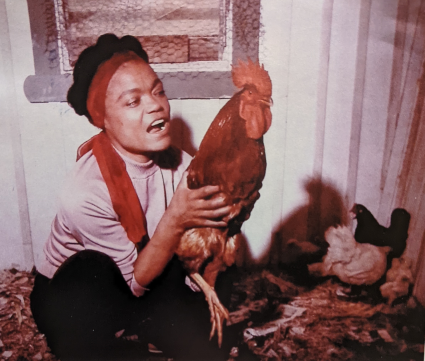
“My mother may have been known as a consummate talent, coy sex kitten, and courageous trailblazer who helped break down racial barriers, but she began her long, illustrious life in a distinctly different way. As she would be the first to tell you, she was ‘just a poor cotton picker from the South.’ And no matter how far she got in life — and considering that she was world-famous by the time she was 23, and was still headlining when she was 81, I’d say that she went pretty far – on some level she still always felt like ‘just a poor cotton picker from the South.’”
-Kitt Shapiro
.
.
Watch a 1962 television performance of Eartha Kitt singing “I Want To Be Evil.” (The album recording was first released in 1953 on RCA/Victor Presents Eartha Kitt)
.
JJM Your mother was often publicly referred to as a “sex kitten,” and remembered in her December 26, 2008 New York Times obituary as a “seducer of audiences,” who, along with Lena Horne, was “among the first widely known African-American sex symbols.” Orson Welles famously proclaimed her to be “the most exciting woman in the world.” How would you describe her as your mother?
KS She wasn’t perfect, but she was a down-to-earth person who wasn’t a sex symbol and glamorous at home. She was a hands-in-the-dirt, hands-on parent.
JJM You write in the book about her being shy, that she felt proper use of the language was important, and that she expected you to be polite…
KS Yes. As a parent she was a very strict disciplinarian, but she was also incredibly loving. She would often tell me how much she loved me, and she was very affectionate with me. She was also very much a recluse in many ways – she wasn’t around people all the time. She didn’t socialize in the show business world, and she liked her privacy and requested that people respect mine as well. So, in many ways she was the complete opposite of what people saw on stage and screen.
JJM I understand she had stage fright…
KS Yes, that’s right. She was always afraid that she wasn’t going to be accepted because she’d been rejected and given away as a child, and those emotional feelings and feelings of abandonment stayed with her for her entire life. Before she would step on stage there was always a moment of fear and self-doubt, wondering if people were actually going to show up, and if they did, she’d question whether they’d enjoy her performance. It’s interesting because, even as accomplished as she was, she possessed a great deal of inner-questioning and fear.
JJM What is your first memory of your mom?
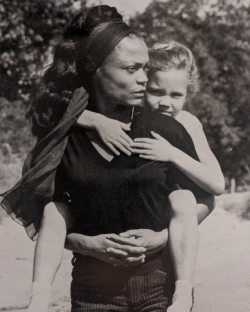
KS It’s hard to know what my first actual memory of her is because I was always around her from the day I was born. She was very much a hands-on parent so I was never out of her sight, so while I can’t recall a specific memory, I just remember being in her presence and being incredibly loved by her.
JJM Your mom grew up in South Carolina, and her childhood was complex and heartbreaking. It was especially sad that she didn’t really know her own mother, and the circumstances for her having to give Eartha up. What was it like for you to hear your mother talk about her childhood?
KS It was really hard because she carried these scars and emotional baggage around with her for her entire life. My childhood was the complete opposite from hers – knowing and having the love of my mother – so it is difficult for me to imagine that feeling of not knowing who she was or what her family origin “roots” were. What I find interesting is that she always yearned to know the identity of her father in order to have an understanding of who she really was. Not knowing anything about him had to be very disorienting for her for much of her life. Something she’d often say is that she would take the manure that’s been thrown on her from her life challenges and use it as fertilizer, to turn adversity into strength. While she was good at doing that, I’m sure that didn’t stop her from wondering where she came from.
JJM She found her birth certificate late in her life, but her father’s name was redacted from it…
KS Yes. The two of us were in the judge’s chambers in Columbia, South Carolina when we were given access to her birth certificate. We found it interesting that we weren’t allowed to take a photo of it or to make a copy of it, and also that the relevant information she was looking for – the identity of her father – was redacted. We were bewildered how it could still be possible for the state of South Carolina to protect the identity of someone who had long been deceased, but that was just the way things were done back then. Her father was most likely a white man, and probably from a prominent family.
JJM So this redaction would have taken place at the time of your mother’s birth?
KS The judge – an African-American woman – thinks that was the case because it was common practice at the time to protect the families of the white plantation owners from having any responsibility for their illegitimate children.
JJM So she assumes her birth was the result of a rape?
KS She never knew what the reality was. What I find so interesting is that even after all those years, and after all those times my mother and I have gone down to the South – whether together or on my own since her death – nobody down there is sure who her father was.
JJM Since it’s assumed her birth was the result of an interracial rape, that created challenges for her within her own family…
KS Yes, because she was illegitimate and likely the product of a rape, and because her skin color was lighter than what was acceptable in that community – she was referred to as the “yella gal” – she was treated horribly by members of the community, and probably also by family members. One thing she was never able to wrap her mind around is how a community of people could so mistreat a child simply because they were the product of a circumstance they had no control over. I think that’s why throughout her life she strove to defend the underdog and people and communities who felt they didn’t have a voice, because as a child she didn’t have a voice and no way to defend herself from being physically, sexually and emotionally abused. She came away from that knowing the importance of treating human beings with kindness and respect.
JJM Your mother was raised by two different aunts, one in South Carolina and one in Harlem…
KS While the woman in the South was referred to as “Aunt Rosa,” she was probably not a blood relative. She was a woman who my mother was given away to when the Black man her mother married said he wouldn’t have that “yella gal” live in his house. The situation my mother lived in while with Aunt Rosa was abusive, and her aunt in Harlem – a blood relative – took her in after receiving word from family in South Carolina that unless she was removed from that situation, someone was likely going to kill her. So, the aunt brought her to New York to live with her.
JJM What were the circumstances of Eartha Kitt becoming an entertainer?
KS My mother went to public school in New York, and one of her teachers encouraged her to speak up because she was so shy about speaking out in public. She’d give her books of poetry to read, and she also gave her a ticket to see Cyrano de Bergerac at a theater in New York, and it was at that moment my mother realized that she wanted to be up on a stage like that. She auditioned on a dare for the Katherine Dunham Dance Troupe and earned a scholarship to the school, and subsequently joined the dance company, which was really her start in show business.
photo by Raymond Voinquel/Library of Congress
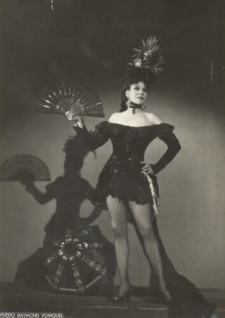
Katherine Dunham at the Theâtre de Paris, 1948
.
photo by Carl Van Vechten/Library of Congress
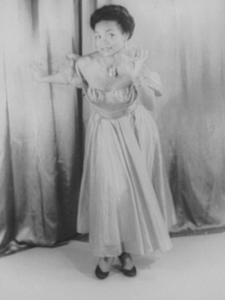
Eartha Kitt, 1952
JJM She traveled overseas fairly early in her career with the dance company, and performed in Paris…
KS Yes. The Dunham company traveled all over, including in South and Central America, and also to Europe. It was during her time traveling with the troupe in Paris that she decided she wanted to try to become a solo artist, and on a day off from the ballet she went to the Café de Paris to perform in a kind of “open mic” or audition session. When Katherine Dunham found out about her ambitions, she warned her that if she did this, she would be fired from the company. My mother felt that since she would be doing this on her day off and on her own time it wouldn’t be taking anything away from what Dunham was doing. But Miss Dunham didn’t accept that, and when my mother decided to pursue this act at the Café, she was fired. She wound up staying in Paris even though she didn’t really have a plan about what she’d do there. She always felt that when an opportunity presents itself you should give it a try, that doors opened for a reason. Ultimately, her decision to pursue the opportunity at the Café de Paris started on her path to becoming a star.
.
A musical interlude…Listen to Eartha Kitt’s 1953 recording of “C’est si bon” (with Henri René & His Orchestra)
.
JJM Her star rose quickly. Some of her most famous recordings were made shortly after that, in the early 1950’s.
KS Yes. “Santa Baby” was recorded in 1953, and before that, in 1952, Leonard Feather had a review on Broadway called “New Faces” that he brought her into, which was her introduction to American audiences. From there she went on to sign with Decca Records and then RCA, where she became a very successful recording artist and live performer.
JJM These record companies were perplexed about how to classify her because she didn’t fit into any of the categories they had created in order to market Black entertainers.
KS She never understood the need to niche people into a specific category because of the color of their skin. If you were a Black singer, record companies felt you had to be in gospel, blues, or jazz, and my mother wasn’t really any of those; she had her own unique sound, and there wasn’t really a category for an artist as unique as Eartha Kitt. She sang in several different languages and had a unique sound quality to her voice, so record company executives were somewhat bewildered by her. My mother just wanted to create music and it didn’t feel it should matter how she was categorized, but the companies felt they needed to in order to effectively sell her records.
JJM What were her own personal interests in music? Do you remember any of the records in her collection?
KS She was a big fan of opera. She loved Maria Callas and Edith Piaf, and she enjoyed sounds that weren’t necessarily the norm. She also loved music from the era of the late 1940s, and we would watch the classic musicals on television together. She was a big fan of Judy Garland, Nat King Cole, Johnny Mathis, and Rosemary Clooney, as well as the big bands of Benny Goodman and Glenn Miller. She loved the powerful sound of horns and of a big orchestra. These were among the sounds I recall listening to.
JJM A pretty eclectic introduction to music for you…
KS One of the other things we’d often do was watch movies together, and my favorites growing up were those starring Bette Davis and Katherine Hepburn. My mother would talk to me about them a lot because she felt they were not necessarily thought of as being Hollywood beauties – they weren’t “pinup girls,” instead they were strong women off the stage. I remember being fascinated by them being strong women, especially since I was being raised by a strong woman. These were the women that my mother talked about, and it’s interesting now as I look back and remember how my mother talked to me about them, and how she talked about their real life stories, and not just the women they portrayed on screen.
JJM Your mother took you with her wherever she performed, so you must have seen a countless number of her shows. Do any stand out in your memory?
KS I remember intensely watching my mother on stage, the way she would command her audience and the way that people were riveted to her. She was able to hold their gaze, even if she were simply standing in silence, and often her silence seemed more captivating than her sound. She was afraid of going on stage, but she wasn’t afraid once she was on it, and once she was on it she absolutely held the audience her hands. Whether she was on stage at Caesar’s Palace in Las Vegas or the Palladium in London or Carnegie Hall, or even in smaller rooms, at five-foot-two inches tall, this tiny little woman held such enormous power. Her performances weren’t filled with dancers, it was mostly just her standing on stage with an orchestra, and I was always enthralled by her incredible ability to just be up there by herself.
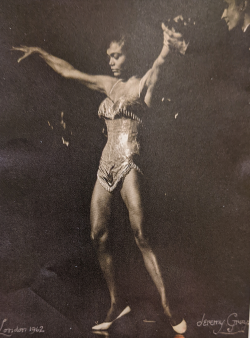
Eartha Kitt performing in London, 1962
.
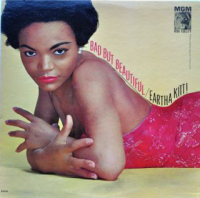
The album cover to her 1962 album Bad But Beautiful (MGM)
JJM She was mesmerizing, particularly to men of our parents’ generation. She was what men referred to at the time as “exotic,” and she was also erotic and outspoken, which was unusual at the time, particularly for a Black female popular entertainer. She was incredibly alluring yet unapproachable, so there was something “illicit” about her that white men of the time found thrilling and interesting and attractive…Does that make sense?
KS Yes, it actually does make a lot of sense. I remember when I was young, children would be mesmerized by her. There was something absolutely captivating about her. I can’t really grasp what it was because I think it was more than just what you see, it was also what you felt. She possessed an aura you could feel when she walked into a room, and people would just stare at her. And although she would say she wasn’t the most talented person, she had enormous talent. She combined her exotic sensuality with the sound of her voice and it commanded people’s attention. So, yes, I totally understand what you are saying because I saw it whether she walked into a room holding a bag of groceries, or if she were on stage in front of a large audience. She was fascinating.
JJM In retrospect, the fascination with Eartha Kitt was probably about power. She had incredible charisma, stage presence, sexual energy, and a powerful intellect in a way few artists of her era – whether Black or white – had.
KS I think that’s right, yes.
JJM In 1960, your mother married your father Bill McDonald, a white man of Irish and German descent. What attracted them to each other?
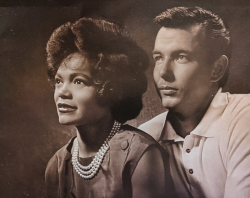
A portrait of Eartha Kitt and husband Bill McDonald
KS God if I know! [laughter] In some respects it’s probably because my mother had been hurt many times and she just wanted to be with someone who was “normal,” which is what many celebrities strive for. So it could be said that she was looking for a kind of grounding. She was also getting a little bit older and was ready to settle down and have children, and he seemed like the right person for that. They took to each other immediately. He had a very strong mother who adored my mother, and she loved that piece of their relationship. I will say that as my mother got older she didn’t talk very kindly about my father, but she loved him and was in love with him, I just think she hoped their marriage, which only lasted for five years, would have turned out differently.
JJM Your dad was badly wounded in the Korean War and could have suffered from PTSD at a time when there was little understanding of it, or even sympathy for it. In those days veterans were mostly expected to just suck it up and deal with their war trauma. He also suffered from a drug addiction. These must have been difficult challenges for their marriage…
KS My father did talk quite a bit about his experience in Korea. He was just a kid – only 19 years old when he served there – and there was an extreme level of brutality during the war that he had to take part in. So, yes, I think my father absolutely suffered from PTSD, and his drug addiction began with an opioid addiction from all the surgeries he had after he was wounded, and as we know now, opioids can be the beginning of a long downhill spiral.
JJM Did your mom face resentment in the Black community for marrying a white man?
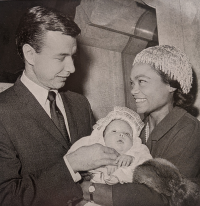
Bill McDonald and Eartha Kitt at daughter Kitt’s christening
.
photo courtesy of the author
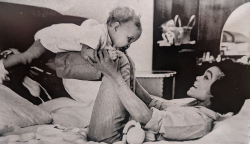
A mother and daughter “workout”
KS Yes. She faced resentment even prior to marrying a white man because she always wanted to identify as a human being first, and not so much as a Black woman. She would ask why a person had to be categorized. Why can’t I just be a person? So that in itself separated her from the Black community because it was felt she was “acting all white,” and that she thought she was better than everybody else. Some of that had to do with my mother’s speech, her diction – which was important to her. She felt that you must speak clearly and eloquently, that you need to pronounce words properly, and that there is a proper way of speaking. It wasn’t so much that she was trying to get rid of an affectation or an accent as much as she was just trying to speak correctly in her mind. That also sent a message to some members of the Black community that she was trying to separate herself from being Black and that she was trying to act white, which was something that was often said. That’s certainly not a struggle unique to her. But after traveling the world, my mother felt that the way you speak and the way you present yourself is very important, and it changed the way people treated you. She couldn’t change the color of her skin or the circumstances she was born into, but she could change her behavior in order to be treated more respectfully and equally. That’s something she always talked to me about, the importance of being polite and kind, of having good manners and to behave in a certain way that will command respect from others.
JJM We’re living during a time when interracial marriage is accepted, and in many communities it’s even commonplace. While you’d hear about the occasional interracial marriage, and celebrities like Sidney Poitier and Harry Belafonte would make the news for dating white women, 60 years ago it was much more noticeable and an incredibly controversial cultural phenomenon. So I’m sure your mom must have paid a price within the Black community when she married a white man…
KS Yes, she did, and she struggled a lot with racist behavior too, even after she became a famous person. For example, she would talk to me about the difficulties she had in buying a home in Beverly Hills in 1957 due to the fact she was a Black person. This wasn’t unique to her, of course – Nat King Cole famously had a similar experience. So even though she had the money, it was challenging, and that’s the irony, right?
JJM Do you recall witnessing episodes of racism that were directed at your mom?
KS By the time I was born my mother was already internationally famous, and people are more impressed with celebrity status and fame than they are worried about race. You could be the most racist person in the world, but if someone like Beyonce or LeBron James walked in the room, you’d want to talk to them and ask for their autograph. I witnessed that as Eartha Kitt’s daughter. That being said, she would talk about how often she’d open the door to her home in Beverly Hills, and the people there to deliver a package or ask a question would think she was the maid. I didn’t personally witness seeing her treated badly or differently, but we lived in the middle of a bubble in Los Angeles. Beverly Hills, California is not exactly what the rest of the United States is like. It would have likely been different if we lived in Missouri.
.
A musical interlude…Listen to the 1959 recording of Eartha Kitt singing “I’d Rather Be Burned as a Witch” (Universal)
.
JJM During a 1968 luncheon at the White House, your mom told Lady Bird Johnson and the other women assembled; “You send the best of this country off to be shot and maimed. They don’t want to go to school because they’re going to be snatched off from their mothers to be shot in Vietnam.” This was one of the most direct and powerful anti-war statements of that period. You were only seven years old at the time, but perhaps you remember about how your mother characterized this event?
KS I do remember because she talked about it privately as well as publicly. I think her comment had a lot to do with my father having returned from Korea in his state and her seeing what the ramifications of war are, and also of her visiting with draft resisters and the young people who were opposed to our involvement in Vietnam. She didn’t believe that young men should be drafted and dragged into a war they didn’t believe in, and she wasn’t afraid to express that to anyone. She felt if you asked for her opinion that you wanted to hear how she felt.
She was surprised at the incredibly negative response she received from the comments she made at the White House because she didn’t feel she was disrespectful to Mrs. Johnson – she didn’t yell or scream at her, nor did she see her being brought to tears as the press had reported. That being said, when my mother felt very strongly about something, she would speak in a very powerful tone. So I think the fact that her words were taken in such a manner, it was probably due to what she said and not how she said it. She was taken aback by the way things unfolded, with President Johnson taking it personally and then attacking her personally. She felt hurt and confused. She also felt that freedom of speech is what separates the United States from many other countries in the world, and here she was in the White House where it should especially be a place to say what you feel, but discovered that wasn’t necessarily the case.
JJM President Johnson immediately engaged in a smear campaign to protect himself and his wife’s honor, and Eartha Kitt was an easy target because she was strong, outspoken and Black – all components that helped raise the cultural temperature against her.
KS Right. She wasn’t going to get a lot of people running to her defense given that she was a beautiful, middle-aged Black woman. All the planets aligned in Johnson’s favor.
JJM This was clearly a life-changing event, not just for her, but for you also, because as a result of Johnson’s smearing of your mother, she was “blacklisted” in Hollywood, and the two of you had to travel overseas extensively because that’s where she could find work. You traveled all over the world…
KS The positive piece of that is because my mother was already internationally known she could find work beyond the United States. She was a single mother who had to support her family, and she had to do what she had to do, which was to work overseas, which she was able to do consistently. While she was lucky in that regard, she would have preferred to have worked in the United States. That incident unraveled her world, and it stayed with her for the rest of her life. That being said, she would not have changed what she said in the White House – she had no regrets because she always felt that if you speak your truth from your heart, you can’t make a mistake.
JJM The two of you were incredibly close, literally and figuratively. You had a deep mother/daughter connection, and you were dear friends also. Did this create challenges for you as you got into your teenage years, trying to individuate and create your own life separate from her?
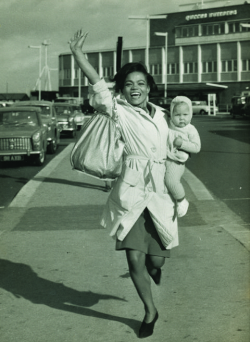
KS Yes, we were very close, and we were a very good fit for each other. She would often introduce us to others as “I’m Eartha and this is Kitt,” as if I completed her somehow, and I think in many ways I did. I gave her roots, I give her a foundation, and I gave her a sense of family she had yearned for her entire life. But it’s not easy carrying a parent’s name your entire life, and it’s not easy growing up as a child of a celebrity. My biggest issue was probably that my mother loved me so much that it was almost too much, and it certainly felt that way as a teenager.
She often said that you can’t love a child too much because we all yearn to be loved – that is our nature as human beings. But as a young adult, too much love could feel overwhelming. As I became older and tried to separate from her a bit – for example, I didn’t want to travel as much with her as she toured the world, and I wanted to stay home and be with my friends – my mother took that very personally at times. So, even though she could rationalize that as an adult and understand that’s the way it’s supposed to be, it was still hard for her, and it was subsequently hard for me as well.
Because my mother had such a difficult childhood, she always carried that fear of being rejected, of being left behind, so that was another consequence of her complex past that I frequently encountered. She would get emotional at times when I told her I didn’t want to do something or go somewhere with her, and it was especially difficult when I got married! I don’t think I ever lived more than 30 minutes away from her, but at times the way she acted you’d think I lived on the other side of the world. She struggled with my separating because I wanted and needed to be my own person, and as much as she encouraged that for me it wasn’t easy for her. But we were very lucky because we developed such a bond while I was growing up, and she showed me such unconditional love early on that we were never not going to love one another. We were incredibly close until the day she died.
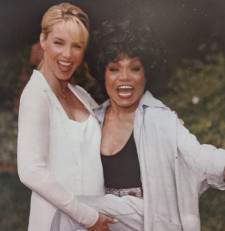
Kitt Shapiro and Eartha Kitt
JJM What do you miss most about your mom?
KS I miss how she thought I was the funniest thing on the planet. She loved everything I did. When I was a little girl I would entertain her by putting on shows for her. I remember learning Red Skelton’s entire Gordon’s Dry Gin routine, pretending that I was drunk, and then performing it for my mother, and she would roll on the floor in hysterics. I was probably all of nine years old at the time. So I miss her laughter – even when she was sick and in her final days, we laughed together. I’m lucky to have had that experience, and I’m blessed that I understood how lucky I was while she was still alive. I also miss her voice, and I miss the way she’d smile at me as an adult, just beaming with pride. As a child, there is nothing like having a mother who loves you.
JJM What do you want people to remember most about your mom?
KS She always felt that people should stay true to themselves, and to follow their hearts. She also felt it is important to treat others with kindness, respect and empathy, and when you do so, you learn about each other. She felt that we all share a small planet and everyone has a right to be here. You don’t have to love each other, but we all have to accept the fact that we all have a right to exist, and the right to be who we are, that being unique is something to embrace and be grateful for. And I also want people to know that this woman who they saw up on the stage as this glamorous sex symbol was a fascinating, down-to-earth, loving human being.
.
.
photo courtesy of the author
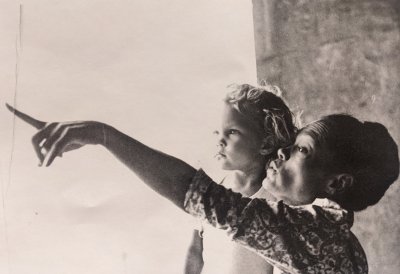
.
…..“She closed all of her concerts with the song “Here’s to Life,” by Artie Butler and Phyllis Molinary, because the lyrics captured so well who she was. They spoke to every part of her essence.
No complaints and no regrets
I will believe in chasing dreams and placing bets
And I have learned that all you give is all you get
So give it all you got…
…..“That was truly my mother. She did give it all that she had, and with her, it was “Take me warts and all.” She made no excuses for herself.”
-Kitt Shapiro
.
.
Listen to the 1994 recording of Eartha Kitt singing “Here’s to Life” (DRG)
.
.
___
.
.
Eartha & Kitt: A Daughter’s Love Story in Black & White (Pegasus Books)
by Kitt Shapiro (with Patricia Weiss Levy)
.
.
Praise for the book
.
“Revealing, poignant, and beautifully told, Eartha & Kitt does exactly what it sets out to do. The book not only provides even more context behind the incredible woman that her mother became despite an incredibly difficult young life, but it also revels in the shared stories of Eartha’s and Kitt’s lives together in an intimate way that, prior to the release of this book, had yet to be told. The memoir is entertaining and heartfelt, and fans will absolutely love it.”
-Scott Neumyer Shondaland
.
“With this memoir, Kitt’s daughter Shapiro wants to communicate to readers that her mother was more than her sex kitten professional persona—Kitt was also an outspoken civil rights activist [who] considered her daughter to be her greatest accomplishment. An inspiring story of the strong bond between a famous mother and her daughter.”
-Library Journal
.
“In a richly detailed and loving memoir of singer and actress Earth Kitt, her daughter describes her successful career and the special bond they shared.”
-Shelf Awareness
.
.
___
.
.
Kitt Shapiro is the only child of legendary entertainer Eartha Kitt. She managed her mother’s performances and recording career for many years, and now manages her estate. She is the founder and owner of Simply Eartha, “accessories that SAY something,” a lifestyle and accessories brand honoring her mother’s words, wisdom, and beauty, and the owner of WEST, a women’s fashion boutique, located in Westport, Connecticut.
.
Patricia Weiss Levy is an award-winning writer and journalist who has been nominated twice for a Pulitzer Prize. Her memoir, The Adulterer’s Daughter: The Life, Loves, and Longings of a Girl Whose Father Strayed, was published in 2016. Her work has also appeared in The New York Times, New York Magazine, USA Today, The Hartford Courant, and Good Housekeeping. She spent 12 years as a staff writer at the Sunday magazine of The Hartford Courant, where she penned more than 50 profiles, investigative pieces, and other cover stories. Her personal blog, NiceJewishMom.com, is read worldwide
.
.
___
.
.
This interview took place on November 9, 2021, and was hosted and produced by Jerry Jazz Musician editor/publisher Joe Maita
.
.
.




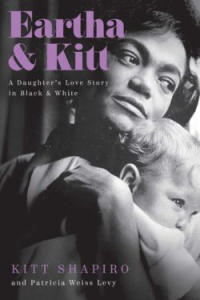
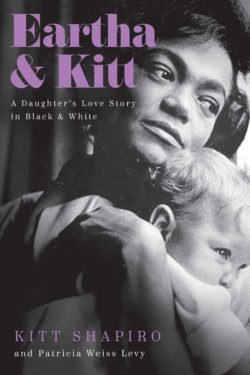

























Love it. I wish whole heartedly how much she is loved and respected in the black community. We love you Eartha may your spirit feel the love we have for you